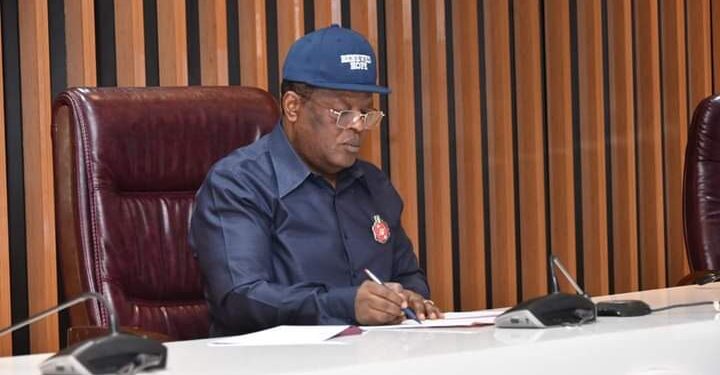The Federal Government on Wednesday gave assurance of early completion of repair works on three major Lagos bridges.
The Minister of Works, Mr David Umahi, and the Coordinating Minister of Finance and the Economy, Mr Wale Edu, gave the assurance during an inspection of the lagoon sections of the Third Mainland, Carter and Eko Bridges.
The ministers, alongside contractors and top directors of the Federal Ministry of Works, spent almost two hours in boats navigating under the bridges.
After inspecting the lagoon sections, the ministers went on land to inspect the under deck of Carter Bridge and Ijora section of Eko Bridge.
They later inspected the Lagos Ibadan Expressway and the ongoing rehabilitation of flyover at Lotto Junction.
NAN reports that both ministers had earlier on Tuesday undertaken the inspection of the ongoing rehabilitation of the top deck of the Third Mainland bridge.
Speaking with journalists, Umahi said the joint assessment was for his Finance and Economy counterpart to have first hand knowledge of the projects and cost implications.
Umahi, said President Bola Tinubu had approved funds for comprehensive works on the two carriageways of the third Mainland Bridge, address challenges on the slab elements and ensure adequate maintenance of the bridges.
He raised alarm over the degeneration of the Marina shorelines, which he described as awaiting disaster because the damage was threatening the pillars of the Lagos Blue Rail Line.
Umahi said though the shorelines required N146 billion but noted that only N1 billion was available for the project in the budget.
Umahi expressed satisfaction with the ongoing repair works on the top deck of the Third Mainland Bridge, and said the repair would be completed and the bridge reopened to traffic latest by April.
“It is going to be a classic reinstated bridge by the time we finish,” he said.
He said contractors would begin work on the underdeck and lagoon sections of the Third Mainland and Carter Bridges next week.
He added that advertisement for bids for facilities on the Lagos-Ibadan Expressway were also set to begin within a week.
On his part, Edun expressed satisfaction with the designs, implementation and costs of the projects.
Edun assured of adequate funding of all infrastructure in line with the core agenda of the President Bola Tinubu to further grow the nation’s economy.
He said the federal government was working towards achieving 77 per cent increase in its internally generated revenue to boost the economy and fund critical infrastructure across the nation.











